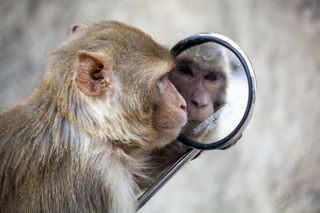Animals
Explore Animals
Editor's Picks
Latest about Animals

Bright yellow sea snail named 'margarita' in honor of late musician Jimmy Buffett
By Harry Baker published
The margarita sea snail, which shoots out a toxic mucus web to catch prey, was discovered on a coral reef in the Florida Keys and was named after Buffett, who died on Sept. 1.

Why do dogs eat poop?
By Hannah Loss published
Life's Little Mysteries Poop eating is a natural behavior in dogs; although it may disgust humans, it usually poses no threat to your canine's health.

Loads of mammals — including cats — glow under UV light, but we don't know why
By Christine Elizabeth Cooper, Kenny Travouillon, Linette Umbrello, Jemmy Bouzin, Simon Lewis published
Fluorescence found to be extremely common among mammals, and may be the "default status" — but exactly why that is remains unclear, scientists say.

How many animals have ever existed on Earth?
By Joanna Thompson published
Life's Little Mysteries To figure out this mind-bogglingly high number, we need to know how many species have ever lived, dig deep into the fossil record and do a lot of math.

Mangrove leaf slug: The solar-powered mollusk that gobbles up sunlight then goes months without eating
By Sascha Pare published
This frilly slug lives in the mangroves of southeastern Asia and Australia, lounging in shallow pools of water and scraping up algae from which it gains the ability to photosynthesize.

Why do so many baby animals have spots?
By Amanda Heidt published
Youngsters often hunker down to hide from predators, and spots can provide excellent camouflage.

Orcas are harassing and playing with baby porpoises in deadly game that has lasted 60 years
By Sascha Pare published
Scientists may have finally figured out why a population of orcas in the Salish Sea have been tossing porpoises around and taking them into their mouths without eating them.

Giant never-before-seen long-necked 'titan' dinosaur unearthed in Europe
By Harry Baker published
The newly identified titanosaur, Garumbatitan morellensis, roamed what is now Spain around 122 million years ago. The unusual shape of some of its bones could hold clues about the evolutionary history of a unique group of sauropods.

'They seemed primed to take over': How the Great Dying doomed the 'beast tooth' and set the stage for the dawn of the dinosaurs
By Michael Mann published
This excerpt from Michael Mann's latest book looks at the Cambrian explosion, the Great Dying and how dinosaurs were able to take over thanks to changes to the climate 250 million years ago.
Live Science newsletter
Stay up to date on the latest science news by signing up for our Essentials newsletter.

